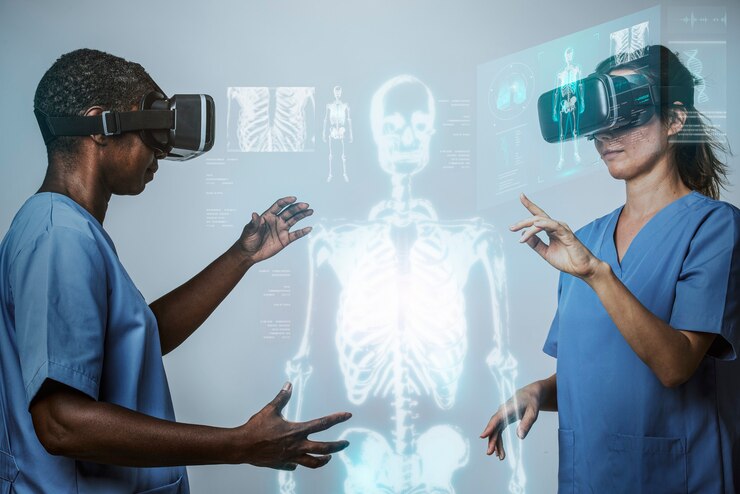
Join our Mailing list!
Get all the latest news, upcoming courses, and exclusive deals.
"*" indicates required fields

March 20, 2024
Written by Maryann Uju Chioke
Artificial Intelligence (AI) is making a revolutionary impact in healthcare. The global AI in the healthcare market is forecasted to grow at a compound annual growth rate of 36.4% from 2024 to 2030 to reach $208.2 billion (Grandview research). The integration of AI and automation in healthcare is a silent force transforming the way we diagnose, treat, and manage patient care.
AI is streamlining processes allowing for quicker diagnostics and expediting treatment plans. Machine algorithms analyze medical images with precision, aiding healthcare professionals in identifying subtle anomalies that may be overlooked. Through the manipulation of mass electronic health records, AI finds similar cases, treatments, and symptoms and helps physicians ask the most effective questions to help the patient receive accurate diagnosis and treatment.
Automation significantly reduces repetitive tasks in healthcare. Medical software company Mobius MD reported that doctors spend more than 15 hours per week on paperwork and other administrative tasks. AI automates routine administrative tasks, such as appointment scheduling, patient registration, and billing, which reduces burnout and allows healthcare professionals to focus on patient care.

In personalized medicine, AI crunches enormous datasets, identifying patterns that could signal potential health issues and enable treatment plans tailored to individual patient needs. This approach swiftly crafts personalized treatment plans by analyzing individual factors like medical history, environment, lifestyle, and genetics. These algorithms ensure healthcare professionals intervene early, providing timely and targeted care.
Surgical procedures now integrate AI-driven robotic systems, granting surgeons precision and dexterity. These robotic assistants contribute to reduced complications, quicker recovery, cost efficiency, and an improved surgical experience. In 2023, robot-assisted surgery led the market with a substantial 24.5% revenue share, and it’s projected to experience the highest CAGR of 39.2% from 2024 to 2030.
The reality is that the healthcare sector faces a significant workforce gap that is only expected to widen. The World Health Organization (WHO) estimates global demand for healthcare workers to double by 2030, reaching 80 million health workers. This means the current supply of nurses, midwives, and healthcare assistants will not meet current or projected future needs.
Contrary to the fear of losing human expertise in healthcare, AI enhances the capabilities of healthcare professionals. The need for human interaction in healthcare is likely to keep AI on the sidelines as a supportive tool, rather than a replacement. While AI proves valuable in complementing a physician’s workflow and improving the quality of decision-making, it is essential to acknowledge that technology can never fully replace the essence of being a physician and the very significant patient-physician relationship that exists for each individual.

Self-paced instructional formats and stackable certifications are increasingly becoming the norm and are accessible and affordable. Engage in ongoing training, attend workshops, and gain competencies to stay updated with the latest advancements in medical technologies, treatments, and healthcare policies.
For instance, TALENT’s mental health courses provide industry-verified insights that address the skills gap in the mental healthcare environment and better prepare the inter-professional healthcare workforce working in mental healthcare settings.
Get familiar with emerging technologies. Enrol in courses that cover AI applications in healthcare, as understanding these technologies is becoming increasingly essential in modern medical practices.
Learn how to use telemedicine tools and digital health platforms. These technologies are reshaping the way healthcare is delivered, offering opportunities for remote patient monitoring, virtual consultations, and improved patient engagement.
Healthcare regulations evolve, impacting practices and patient care. Regularly update yourself on healthcare policies, regulations, and compliance standards to ensure that professional practices align with the latest requirements.
In conclusion, the symbiotic relationship between AI and healthcare is redefining industry standards. As technology advances, staying informed becomes paramount. TALENT is your ally in navigating this transformative journey, ensuring we’re not just a witness but an active participant in the healthcare revolution.
Ready to stay ahead in the healthcare revolution? Explore our Data-Driven Management for Healthcare Course or our Mental Health Courses to stay ahead of the curve in your healthcare career.
"*" indicates required fields